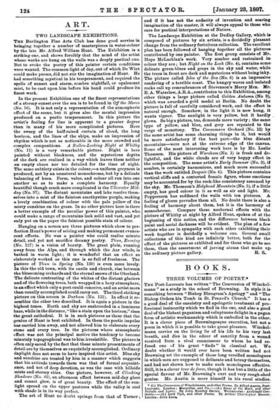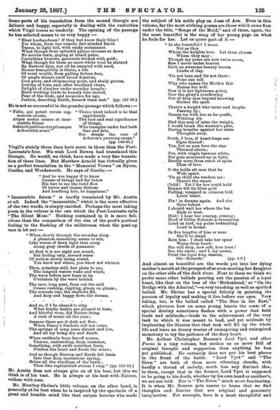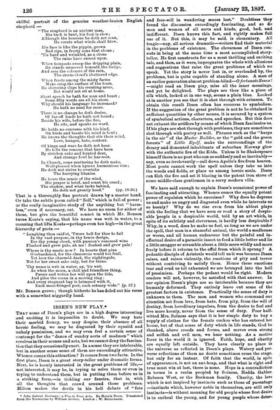BOOKS.
THREE VOLUMES OF POETRY.*
THE Poet-Laureate has written" The Conversion of Winckel- mann " as a study in the school of Browning. In style it is something between "Bishop Blougram's Apology" and "The Bishop Orders his Tomb in St. Praxed's Church." It has a a good deal of the casuistry and apologetic treatment of pro- fessional insincerity which we find in the one, and also a good deal of the blatant paganism and voluptuous delight in a pagan form of artistic workmanship which is embodied in the other. It is a clever piece of Browningesque execution, but not a poem in which it is possible to take great pleasure. Winckel- mann carries on the living lie of his life to his very last breath, and dies in the odour of sanctity from a wound received from a rival connoisseur to whom he had re- fused one of his great " finds " in classical art. We doubt whether it would ever have been written had not Browning set the example of those long versified monologues in which men are supposed to delineate and betray themselves, and had not shown how to make such monologues effective. Still, it is a clever tour de force, though it has but a little of the special flavour of Mr. Browning's curt and very rough-shod genius. Mr. Austin is more himself in his rural studies.
• (I.) The Conversion of Winckeimann. and other Poems. By Alfred Austin, Poet. Laureate. London: Macmillan and Co.—(2.) Songs f the Maid, and other Ballads and Lyrics. By John Huntley Skrine. Westminster, Archibald Con- stable.—(3.) Lord Vet, and other Poems, By Arthur Chrietophcr Benson.. London: John Lane,
• Some parts of his translation from the second Georgic are delicate and happy, especially in dealing with the rusticities which Virgil treats so tenderly. The opening of the passage he has selected seems to us very happy :—
"Blest husbandmen! if they but knew their bliss !
For whom, from war remote, fair-minded Earth Teems, to light toil, with ready sustenance.
What though from splendid palace streams at dawn No servile train, gaping at inlaid gates, Corinthian bronzes, garments tricked with gold; What though for them no snow-white wool be stained By Eastern dyes, nor oil be smeared with nerd, Secure tranquillity is theirs, a life Of rural wealth, from galling failure free, Of ample leisure amid broad domains, Cool grots, and shimmering pools, and shady groves, Lowing of kine, and, after woodland chase, Delight of slumber under noonday boughs : Hard-working hinds to homely fare inured, Fear of the Gods, and reverence for age. Justice, deserting Earth, forsook them last." (pp. 137 39.)
He is not so successful in the grander passage which follows :—
" Felix, qui potuit rerum cog- noscere causes,
Atque metus omnes et inex- orabile fatum Snbiecit pedibus strepitumque Acherontis avari." Nor dreads the roar of Acheron's yawning surge."
(pp. 140-41.)
Virgil's stately three lines have more in them than the Poet- Laureate's four. We wish Lord Bowen had translated this Georgic. He would, we think, have made a very fine transla- tion of these lines. But Matthew Arnold has virtually given us a perfect translation in the "Memorial Verses" on Byron, Goethe, and Wordsworth. He says of Goethe :—
"And he was happy if to know Causes of things and far below His feet to see the lurid flow Of terror and insane distress And headlong fate, be happiness?'
" Inexorabile fatnm " is hardly translated by Mr. Austin at all. Indeed the " inexorabile," which is the more effective of the two words, is simply omitted. Perhaps the most taking poem in the volume is the one which the Poet-Laureate. calls "The Silent Muse." Nothing contained in it is more feli- citous than the comparison of the rise of the poet's poetical feeling to the flushing of the millstream when the pent-up race is let oat :— " When slowly through the noonday sleep A phantom something seems to stir, Like waves of dewy light that creep Along gray chords of gossamer.
At first it is nor sight nor sound, But feeling only, inward sense Of motion slowly rising round, You know not where, you know not whence.
Then, noiseless still, but plain to see, The languid waters wake and wind; The wave before now fears to be O'ertaken by the wave behind.
The race, long pent, from out the mill Comes rushing, rippling, gleam on gleam ; The runnels rise, the shallows fill, And deep and happy flows the stream.
. . ..... .
And so, if I be shaped to sing What kindly hearts are pleased to hear, And blissful were, did Nature bring A rush of music all the year ; Seasons there are it doth not flow, When Fancy's freshets will not come, The springs of song seem shrunk and low, And all my being dry and dumb.
When suddenly from far-off source, Unseen, unsonnding, deep, immense, Something, with swift resistless force, Flushes the heart and floods the sense ; And as though Heaven and Earth did drain Into that deep mysterious spring, Brims all the windings of the brain ; Then like replenished stream I sing." (pp. 151-55.)
Mr. Austin does not always give us of his best, but this we think is of his best. He is always at his best with Nature, seldom with man Mr. Huntley Skrine's little volume, on the other hand, is generally at its best when he is inspired by the spectacle of a great and humble mind like that unique heroine who made
"Thrice blest indeed is he that apprehends The root and real significance of things, Who tramples under foot both fear and fate,
the subject of his noble play on Joan of Are. Even in this volume, far the most striking poems are those which come first under the title, "Songs of the Maid," and of these, again, the the most beautiful is the song of her young page on what he feels for her. Let us quote part of it :—
"Is she beautiful P I muse.
Not as they Whom the knights love. Let them choose Whom they may : Though my years are now twice seven, Saw I never under heaven Such an awesome beauty leaven Limbs of clay.
'Tis not here and 'tie not there : None can tell Why who names the Maiden fair Names her well.
Now it is her lightsome going, Now the glory's overflowing Out of deep eyes beyond knowing Strikes the spell.
There's a knight who turns and laughs Passing by ;
Names me with her as he quaffs, Winking sly.
Had this arm of mine the weight, I would break the wanton's pate, Daring breathe against her state Thoughts awry.
Sooth, I love, if heart-leaps are Signs thereof : Yea, but as men love the star Throned above; For, with virgin harness white, She goes armoured-up in light, Hardly more from reach of spite.
Than of love.
0 she holds all men that be Wide apart.
'Tis as child she tenders me : There's the smart.
Child ! Yet I for her could hold Banner till its lilies gold Falling, wrapped in crimson fold. Louis' heart.
Fie ! in dreams again. And she Gave behest I should wait her where the lea Ends to west.
Hist! I hear her coming, coming ; Hoof of blithe Rolande a-drumming Loud on turf, my pulse bednmbing Loud in breast.
In five lengths of him or near She'll to stand.
Rein him : I shall take her spear Warm from hand : She will drop, how soft, how keen ! See, the smile : and I, my queen, Print the loyal kiss, unseen,
On—Rolande." (PP. 4-81 And almost as beautiful are the words put into her dying mother's mouth at the prospect of so soon meeting her daughter on the other side of the dark river. Next to these we think we prefer some other ballads pouring out the passion of a loyal heart, like that on the loss of the 'Birkenhead,' or "On the Bridge with the Admiral,"—a very touching as well as spirited ballad. Mr. Skrine has a special felicity in painting the passion of loyalty and making it live before our eyes. Very taking, too, is the ballad called "The Star in the East," which pictures how on some young hearts the seruie of a special destiny sometimes flashes with a power that both leads and misleads,—leads to the achievement of the very task to which it was meant to lead, and yet misleads by implanting the illusion that that task will fill up the whole life and leave no dreary wastes of uninspiring and uninspired
monotony to try the patience of the fiery heart.
Mr. Arthur Christopher Benson's Lard Vyet, and other Poems is a tiny volume, but strikes us as more full of original thought and suggestion than anything he has yet published. He certainly does not put his best pieces in the front of the battle. "Lord Vyet" and "The Siren" are both of them mere vibrating chords, with hardly a thread of melody, much less any distinct idea,. in them, except that in the former, Lord Vyet is supposed to be going to his death, whether by his own hand or another's, we are not told. Nor is "The Siren" much more fascinating. It is when Mr. Benson gets nearer to home that we find thoughts and fancies that are original and genuinely imaginative. For example, here is a most thoughtful and
skilful portrait of the genuine weather-beaten shepherd :— "The shepherd is an ancient man, His back is bent, his foot is slow; Although the heavens he doth not scan, He scents what winds shall blow.
His face is like the pippin. grown Red ripe, in frosty suns that shone ; 'Tis hard and wrinkled, as a stone The rains have rained upon.
When tempests sweep the dripping plain, lie stands unmoved beneath the hedge, And sees the columns of the rain, The storm-cloud's shattered edge.
When frosts among the misty farms Make crisp the surface of the loam, He shivering claps his creaking arms, But would not sit at home.
Short speech he bath for man and beast ; Some fifty words are all his store. Why should his language be increased? He bath no need for more.
There is no change he doth desire,
Of far-off lands he bath not heard ; Beside his wife, before the fire,
He sits, and speaks no word.
He holds no converse with his kind,
On birds and beasts his mind is bent;
He knows the thoughts that stir their mind, Love, hunger, hate, content.
Of kings and wars he doth not hear.
He tells the seasons that have been By stricken oaks and hunted deer, And strange fowl he has seen.
In Church, some muttering he doth make, Well-pleased when hymns harmonious rise ;
He cloth not strive to overtake The hurrying litanies.
He hears the music of the wind, His prayer is brief, and scant his creed ; The shadow, and what lurks behind, He doth not greatly heed." (pp. 18-20.)
That is a thoroughly fine portrait drawn by a master hand. Or take the subtle poem called" Self," which is full of power ; or the really imaginative study of the anything but "harm- less," even if necessary, cat. We have no room for either of these, but give the beautiful sonnet in which Mr. Benson turns Keats's saying, that his name was writ in water, to a meaning that lifts Keats—perhaps even too high—in the great hierarchy of poets :— "Laughing thou said'st, 'Twere bell for thee to fail In thy vast purpose, in thy brave design,
Ere thy young cheek, with passion's venomed wine Flushed and grew pale, ah me ! flushed and grew pale!
Where is thy music now ? In hearts that pine O'erburdened, for the clamorous world too frail, Yet love the charmed dusk, the nightingale, Not for her sweet sake only, but for thine.
Thy name is writ in water, ay, 'tis writ
As when the moon, a chill and friendless thing,
Passes and writes her will upon the tide, And piles the ocean in a moving ring : And every stagnant bay is brimmed with it, Each mast-fringed port, each estuary wide." (p. 57.) Mr. Benson grows ; though hitherto he has doled out his verse with a somewhat niggardly hand. English




































 Previous page
Previous page